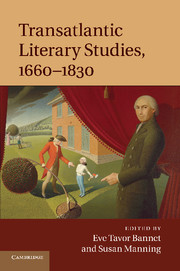Book contents
- Frontmatter
- Contents
- Notes on contributors
- Acknowledgements
- Introduction: British and American genres
- Chapter 1 Transatlantic books and literary culture
- Chapter 2 Transatlantic utopianism and the writing of America
- Chapter 3 Tales of wonder, spiritual autobiographies, and providence tales
- Chapter 4 Life writings
- Chapter 5 Benjamin Franklin and transatlantic literary journalism
- Chapter 6 Theatre, drama, performance
- Chapter 7 Transatlantic American Indians
- Chapter 8 Literature of the ocean
- Chapter 9 “To gird this watery globe”
- Chapter 10 Ghostly and vernacular presences in the black Atlantic
- Chapter 11 Susanna Rowson and the transatlantic captivity narrative
- Chapter 12 Domestic fiction and the reprint trade
- Chapter 13 Transatlantic Gothic
- Chapter 14 Transatlantic Romanticisms
- Chapter 15 Journeys of the imagination in Wheatley and Coleridge
- Chapter 16 Transatlantic historical fiction
- Further reading
- Index
- References
Chapter 2 - Transatlantic utopianism and the writing of America
Published online by Cambridge University Press: 05 January 2012
- Frontmatter
- Contents
- Notes on contributors
- Acknowledgements
- Introduction: British and American genres
- Chapter 1 Transatlantic books and literary culture
- Chapter 2 Transatlantic utopianism and the writing of America
- Chapter 3 Tales of wonder, spiritual autobiographies, and providence tales
- Chapter 4 Life writings
- Chapter 5 Benjamin Franklin and transatlantic literary journalism
- Chapter 6 Theatre, drama, performance
- Chapter 7 Transatlantic American Indians
- Chapter 8 Literature of the ocean
- Chapter 9 “To gird this watery globe”
- Chapter 10 Ghostly and vernacular presences in the black Atlantic
- Chapter 11 Susanna Rowson and the transatlantic captivity narrative
- Chapter 12 Domestic fiction and the reprint trade
- Chapter 13 Transatlantic Gothic
- Chapter 14 Transatlantic Romanticisms
- Chapter 15 Journeys of the imagination in Wheatley and Coleridge
- Chapter 16 Transatlantic historical fiction
- Further reading
- Index
- References
Summary
Introduction: “In the Beginning, All the World was America”
Ever since Plato around 355 bc brought to the world the story of the lost continent of Atlantis, visions of an imaginary ideal society in the western hemisphere have been an integral part of utopian mythmaking in Europe. Though relatively little known during the medieval period, the legend of the antediluvian world of Atlantis was rediscovered by humanists in the early modern period. The fall of Constantinople in 1453 had accelerated the recovery of ancient scientific texts, while the concurrent invention of movable type printing allowed the faster and wider propagation of learning. These developments inaugurated a scientific revolution, which saw great advances in scholarship in areas ranging from geography, astronomy, chemistry, physics, and mathematics to manufacturing and engineering. This expansion in human understanding broke the mold of the humanists’ earlier non plus ultra attitude to their ancient inheritance. But it was the discovery of the New World that added a fresh and invigorating inflection to the ancient myth of the lost utopia. Adam Smith famously described the discovery of America, along with that of a passage to the East Indies by way of the Cape of Good Hope, as “the two greatest and most important events recorded in the history of mankind.” Coming close on the heels of Columbus's voyage, printed narratives such as Thomas More's Utopia (1516) and Francis Bacon's New Atlantis (1527) capitalized on the excitement following the historic event by rallying Europeans to join the revolution in empiricist scientific exploration and speculation.
The key question in this scientific inquiry was not what the discovery of America meant for that continent, but what the discovery of the New World meant for the Old World. That is to say, the geographical, ethnographical, historical, and topographical narratives of America that began to appear in ever-growing numbers in the course of the seventeenth century were in fact narratives of self-exploration and self-critique. It was for this reason that the discovery of “America” was as much a mental process as a historical event. By the same token, “America” was as much a concept or a metaphor as a self-evident geographical space. As in the case of Plato's dialogues of Timaeus and Critias, which hold the original references to the island of Atlantis, the abiding significance of such narratives as Richard Hakluyt the Younger's Discourse of Western Planting (1584), Thomas Harriot's A Briefe and True Report of the New Found Land of Virginia (1590), and John Smith's Generall History of Virginia (1624) is that they mobilized contemporary readers – often indirectly and unintentionally – to examine their own ideas of political and economic power, and hence of government and society.
- Type
- Chapter
- Information
- Transatlantic Literary Studies, 1660–1830 , pp. 28 - 45Publisher: Cambridge University PressPrint publication year: 2011



